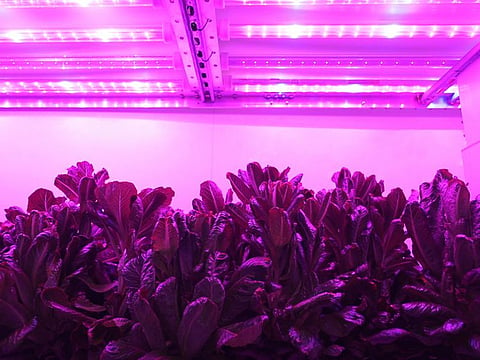Is vertical farming UAE’s next high-growth industry as agritech reaches for the skies?
Investments pour in for vertical farms in UAE as ‘grow local’ becomes popular

Dubai: The UAE landscape has always stood out for its best-in-class gleaming skyscrapers, among them the tallest ones in the world. And now, a new set of vertical structures is entering this space and breaking records on heights.
Vertical farms are catching on in the UAE. Just recently, AeroFarms debuted AgX, a 65,000 square feet R&D vertical farm in Abu Dhabi and said to be the largest of its type in the world. Last year, Bustanica made a splash with its own vertical farm in Dubai - and also one of the biggest of its kind anywhere. (In Saudi Arabia, there are similar ventures in the making, and their backers are sparing no effort in going mega-scale with them.)
Clearly, vertical farms in the UAE are taking on super-sizes and meeting a demand for fresh produce grown organically and nearest to the target consumers. These projects also help - or will do so - in the country’s food security priorities, by reducing reliance on imports where needed. All lessons from what the pandemic has taught the world, through a period when food prices escalated because of supply issues.
But why are vertical farms taking off, literally, in the UAE and Saudi Arabia? Ali Naqash Abbasi is the Farms Operation Manager at Sharjah’s VeggieTech Farms, which made history of sorts by cultivating roughly 150,000 croci Sativa bulbs (saffron) from the Netherlands in vertical farms located at Al Zubair.
“Vertical farming has the potential to produce more food per square metre of land and to use less water than traditional farming methods,” he said. “This makes it well-suited to the UAE’s arid climate and limited arable land.
“And because vertical farms can be located in urban areas, they can reduce the distance that food has to travel to reach consumers, which can help to reduce food waste and carbon emissions.”
Same principles as high-rises
In other words, some of the cost benefits are similar to what developers get from creating high-rises in an urban environment. There is better utilisation of land available and the cost benefits are obvious for those towers built on time and to budget.
As for vertical farms, smoothing their progress in the UAE is the easier availability of updated hydroponics technologies to grow food even in the region’s extremely warm climate.
Sharjah’s VeggieTech Farms also hosts a vast fig plantation and mass-consumption produce such as tomatoes, chillies and leafy veggies.
That said, vertical farming also requires significant energy inputs for lighting, heating and cooling, making operations expensive. “It typically requires large investments in infrastructure and technology to set up and maintain the farming system, which is what the UAE is focusing on at the moment,” said Abbasi. “These farms have three times the harvest cycle in the same time period, hence takes only 25 days instead of the 75 days in conventional agriculture.”
Despite high costs, combining traditional and innovative farming methods, including vertical farming, may be necessary to ensure a sustainable food supply for the growing UAE population base.
New farms, new jobs
There are currently 66 UAE companies addressing the sustainability issue, with UAE-based companies receiving more than $50 billion in investments or around 1.1 per cent of the global capital invested in agritech. And investments in this sector are only growing.
Emirates Group’s Bustanica, a 300,000 square feet facility that uses hydroponic technology to grow leafy greens, is already selling its products in retail outlets such as Geant supermarkets.
Emirates Flight Catering (EKFC) and Crop One invested $40 million to establish Bustanica.
US-based AeroFarms AgX opened to advance sustainable agriculture in arid climates. The venture is expected to improve vegetable and fruit varieties’ genetics and seedling quality to become more resilient to extreme growing conditions.
The partnership will also evaluate and test crops with significant consumer demand, including tomatoes and peppers. David Rosenberg, co-founder and CEO of AeroFarms, said in a statement that such facilities can help solve a broader array of agricultural challenges.
The company has already made several key hires locally. It will employ over 60 engineers, horticulturists, and scientists for its hi-tech labs conducting organoleptic research and precision phenotyping, phytochemical analysis, and research on the next-generation machine.
“Abu Dhabi has made it a priority to advance technological solutions that further economic progress for the region and beyond, and ‘agtech’ falls perfectly into this category,” said Abdulla Abdul Aziz AlShamsi, acting Director-General of ADIO. By extension, expect more vertical farms to sprout in the UAE as agritech becomes a trending growth industry.
Sign up for the Daily Briefing
Get the latest news and updates straight to your inbox


